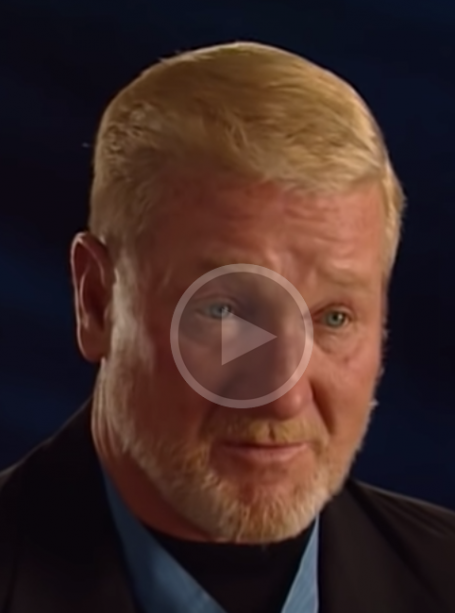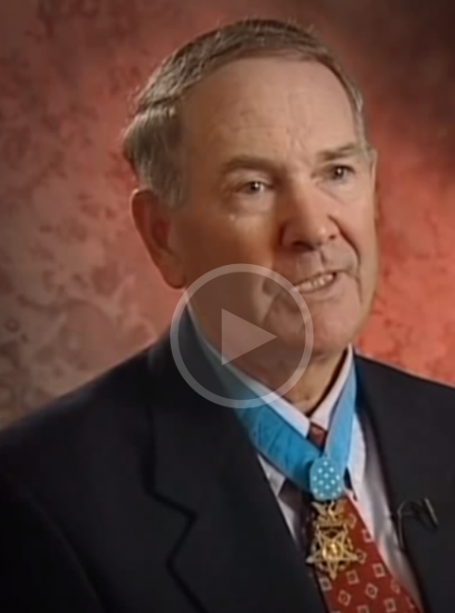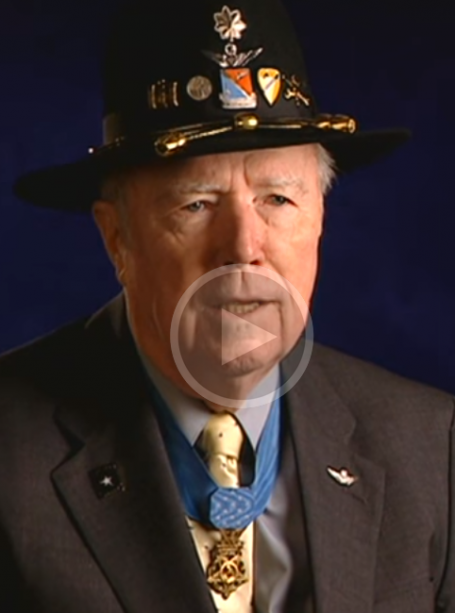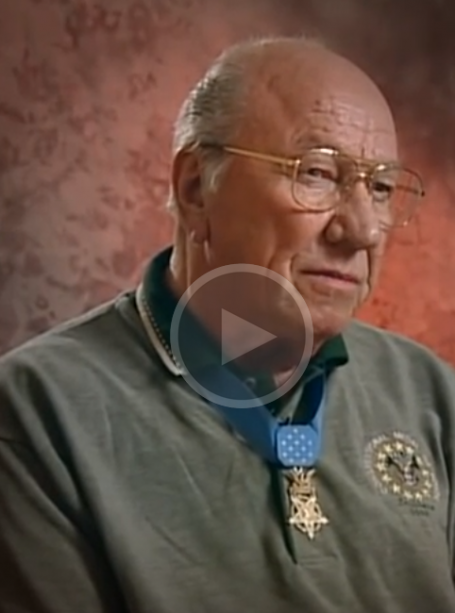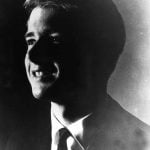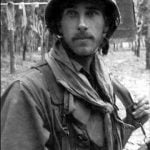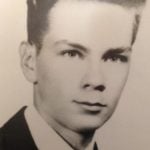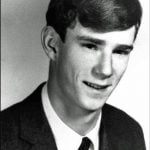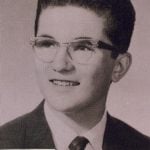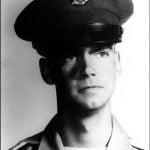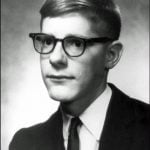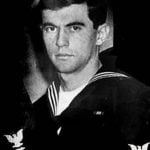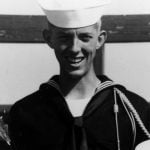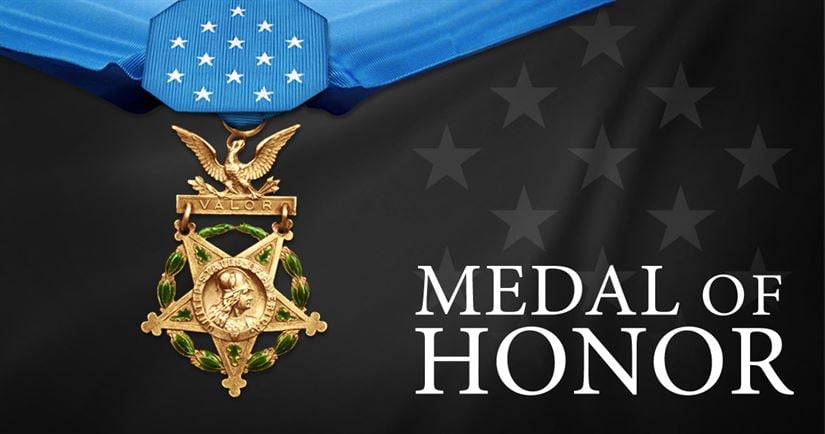

Every Medal of Honor story is unique.
In an uncomfortable war zone thousands of miles from home, chaplains are often the only sense of peace and calm for service members. Navy Chaplain Vincent R. Capodanno was amongst the best, earning the title of the “grunt padre” from the Marines he served. His efforts to support them would take him to foxholes in distant outposts, rainy nights in the jungle and into the chaos of battle.
On September 4, 1967, while providing comfort and aid to the 3rd Battalion, 5th Marines, an already wounded Father Capodanno rushed forward to comfort a wounded corpsman. While administering last rites, he was shot more than 27 times. This act of heroism would earn him the Medal of Honor.
His service to his country was as great as his service to the Roman Catholic Church – and for that he is currently being beatified. That process, known as canonization, is when the church endeavors to prove that a person lived and died in such an exemplary way that they deserve to be recognized as a saint.
Capodanno is one of 160 Medal of Honor recipients who died in the Vietnam War and are listed on The Wall. Of those, 159 were awarded for acts in the Vietnam War. Major General Keith Ware, who died during the Vietnam War, earned his Medal of Honor for actions during World War II.
The Medal of Honor is the highest distinction that can be awarded by the President of the United States, in the name of the Congress, to members of the U.S. armed forces who have distinguished themselves by going above and beyond the call of duty, risking their lives while exhibiting intrepidity and valor.
There are three similar, yet distinct, versions of the Medal of Honor, one for each military department. The medals are similar in that each consists of a variation of a five-pointed star worn around the neck on a light blue ribbon.
Only slightly more than 3,500 Medals of Honor have been awarded to members of all services. Of the millions of U.S. service members who served during the Vietnam War, only 261 were awarded the Medal of Honor, including those who survived and those who died.
Sammy Davis
On November 18, 1967, Private First Class Sammy Davis, wounded and under intense enemy fire, crossed a river to rescue three wounded soldiers near Cai Lay, Vietnam. On November 19, 1968, Davis received the Medal of Honor. The footage from that day as well as Davis’s citation were used as source materials for the film Forrest Gump.
Walter Marm
Second Lieutenant Walter “Joe” Marm, Jr., led an attack against a heavily fortified enemy force on November 14, 1965, personally knocking out several positions in the Ia Drang Valley, South Vietnam. He was presented with the Medal of Honor on December 19, 1966, and three years later volunteered for a second tour of duty in Vietnam.
Bruce Crandall
Major Bruce Crandall made over 20 flights into intense enemy fire during a battle in the Ia Drang Valley, South Vietnam, in November 1965, evacuating 70 wounded and delivering ammunition. The battle was later dramatized in the film We Were Soldiers. On February 26, 2007, Crandall received the Medal of Honor.
Ed Freeman
On November 14, 1965, Captain Ed Freeman made repeated flights into the Ia Drang Valley under intense fire to bring in supplies and evacuate the wounded. Due to a statute of limitations being lifted, Freeman was awarded the Medal of Honor on July 16, 2001.
The Medal of Honor is the Nation’s highest award for valor. 160 Medal of Honor recipients have names inscribed on The Wall. Of those, 159 were awarded for acts in the Vietnam War. A number of medics earned the Medal of Honor during the Vietnam War. Learn a few of their stories below.
Army Medics
Army CPL Thomas Bennet was serving as a medic when he ran through heavy fire to assist his fallen comrades during vicious firefights from February 9-11, 1969.
Citation: For conspicuous gallantry and intrepidity in action at the risk of his life above and beyond the call of duty. Cpl. Bennett distinguished himself while serving as a platoon medical aidman with the 2d Platoon, Company B, during a reconnaissance-in-force mission. On 9 February the platoon was moving to assist the 1st Platoon of Company D which had run into a North Vietnamese ambush when it became heavily engaged by the intense small arms, automatic weapons, mortar and rocket fire from a well fortified and numerically superior enemy unit. In the initial barrage of fire, 3 of the point members of the platoon fell wounded. Cpl. Bennett, with complete disregard for his safety, ran through the heavy fire to his fallen comrades, administered life-saving first aid under fire and then made repeated trips carrying the wounded men to positions of relative safety from which they would be medically evacuated from the battle position. Cpl. Bennett repeatedly braved the intense enemy fire moving across open areas to give aid and comfort to his wounded comrades. He valiantly exposed himself to the heavy fire in order to retrieve the bodies of several fallen personnel. Throughout the night and following day, Cpl. Bennett moved from position to position treating and comforting the several personnel who had suffered shrapnel and gunshot wounds. On 11 February, Company B again moved in an assault on the well fortified enemy positions and became heavily engaged with the numerically superior enemy force. Five members of the company fell wounded in the initial assault. Cpl. Bennett ran to their aid without regard to the heavy fire. He treated 1 wounded comrade and began running toward another seriously wounded man. Although the wounded man was located forward of the company position covered by heavy enemy grazing fire and Cpl. Bennett was warned that it was impossible to reach the position, he leaped forward with complete disregard for his safety to save his comrade’s life. In attempting to save his fellow soldier, he was mortally wounded. Cpl. Bennett’s undaunted concern for his comrades at the cost of his life above and beyond the call of duty are in keeping with the highest traditions of the military service and reflect great credit upon himself, his unit, and the U.S. Army.
U.S. Army SP4 Donald Evans was answering calls for medical aid from men in a nearby platoon when he was killed on January 27, 1967.
Citation: For conspicuous gallantry and intrepidity in action at the risk of his life above and beyond the call of duty. He left his position of relative safety with his platoon which had not yet been committed to the battle to answer the calls for medical aid from the wounded men of another platoon which was heavily engaged with the enemy force. Dashing across 100 meters of open area through a withering hail of enemy fire and exploding grenades, he administered lifesaving treatment to 1 individual and continued to expose himself to the deadly enemy fire as he moved to treat each of the other wounded men and to offer them encouragement. Realizing that the wounds of 1 man required immediate attention, Sp4 Evans dragged the injured soldier back across the dangerous fire-swept area, to a secure position from which he could be further evacuated. Miraculously escaping the enemy fusillade, Sp4 Evans returned to the forward location. As he continued the treatment of the wounded, he was struck by fragments from an enemy grenade. Despite his serious and painful injury he succeeded in evacuating another wounded comrade, rejoined his platoon as it was committed to battle and was soon treating other wounded soldiers. As he evacuated another wounded man across the fire covered field, he was severely wounded. Continuing to refuse medical attention and ignoring advice to remain behind, he managed with his waning strength to move yet another wounded comrade across the dangerous open area to safety. Disregarding his painful wounds and seriously weakened from profuse bleeding, he continued his lifesaving medical aid and was killed while treating another wounded comrade. Sp4 Evan’s extraordinary valor, dedication and indomitable spirit saved the lives of several of his fellow soldiers, served as an inspiration to the men of his company, were instrumental in the success of their mission, and reflect great credit upon himself and the Armed Forces of his country.
U.S. Army SP4 Joseph LaPointe Jr. sacrificed his life by using his own body as a shield in an attempt to save a wounded soldier on June 2, 1969.
Citation: For conspicuous gallantry and intrepidity in action at the risk of his life above and beyond the call of duty. Sp4 Lapointe, Headquarters and Headquarters Troop, 2d Squadron, distinguished himself while serving as a medical aidman during a combat helicopter assault mission. Sp4 Lapointe’s patrol was advancing from the landing zone through an adjoining valley when it suddenly encountered heavy automatic weapons fire from a large enemy force entrenched in well fortified bunker positions. In the initial hail of fire, 2 soldiers in the formation vanguard were seriously wounded. Hearing a call for aid from 1 of the wounded, Sp4 Lapointe ran forward through heavy fire to assist his fallen comrades. To reach the wounded men, he was forced to crawl directly in view of an enemy bunker. As members of his unit attempted to provide covering fire, he administered first aid to 1 man, shielding the other with his body. He was hit by a burst of fire from the bunker while attending the wounded soldier. In spite of his painful wounds, Sp4 Lapointe continued his lifesaving duties until he was again wounded and knocked to the ground. Making strenuous efforts, he moved back again into a shielding position to continue administering first aid. An exploding enemy grenade mortally wounded all 3 men. Sp4 Lapointe’s courageous actions at the cost of his life were an inspiration to his comrades. His gallantry and selflessness are in the highest traditions of the military service and reflect great credit on him, his unit, and the U.S. Army.
U.S. Army SP4 Thomas McMahon attempted to rescue three wounded soldiers despite heavy enemy fire on March 19, 1969. He was able to carry two of the men to safety, but was mortally wounded while trying to rescue the third.
Citation: For conspicuous gallantry and intrepidity in action at the risk of his life above and beyond the call of duty. Specialist McMahon distinguished himself while serving as medical aid man with Company A. When the lead elements of his company came under heavy fire from well-fortified enemy positions, 3 soldiers fell seriously wounded. Specialist McMahon, with complete disregard for his safety, left his covered position and ran through intense enemy fire to the side of 1 of the wounded, administered first aid and then carried him to safety. He returned through the hail of fire to the side of a second wounded man. Although painfully wounded by an exploding mortar round while returning the wounded man to a secure position, Specialist McMahon refused medical attention and heroically ran back through the heavy enemy fire toward his remaining wounded comrade. He fell mortally wounded before he could rescue the last man. Specialist McMahon’s undaunted concern for the welfare of his comrades at the cost of his life are in keeping with the highest traditions of the military service and reflect great credit on himself, his unit, and the U.S. Army.
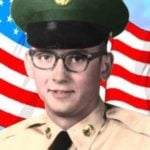
U.S. Army SP5 Edgar McWethy Jr. repeatedly exposed himself to enemy fire to treat his wounded comrades despite being wounded three times himself. He continued to help his fellow soldiers until he was mortally wounded on June 21, 1967.
Citation: For conspicuous gallantry and intrepidity in action at the risk of his life above and beyond the call of duty. Serving as a medical aidman with Company B, Sp5 McWethy accompanied his platoon to the site of a downed helicopter. Shortly after the platoon established a defensive perimeter around the aircraft, a large enemy force attacked the position from 3 sides with a heavy volume of automatic weapons fire and grenades. The platoon leader and his radio operator were wounded almost immediately, and Sp5 McWethy rushed across the fire-swept area to their assistance. Although he could not help the mortally wounded radio operator, Sp5c. McWethy’s timely first aid enabled the platoon leader to retain command during this critical period. Hearing a call for aid, Sp5 McWethy started across the open toward the injured men, but was wounded in the head and knocked to the ground. He regained his feet and continued on but was hit again, this time in the leg. Struggling onward despite his wounds, he gained the side of his comrades and treated their injuries. Observing another fallen rifleman lying in an exposed position raked by enemy fire, Sp5 McWethy moved toward him without hesitation. Although the enemy fire wounded him a third time, Sp5 McWethy reached his fallen companion. Though weakened and in extreme pain, Sp5 McWethy gave the wounded man artificial respiration but suffered a fourth and fatal wound. Through his indomitable courage, complete disregard for his safety, and demonstrated concern for his fellow soldiers, Sp5 McWethy inspired the members of his platoon and contributed in great measure to their successful defense of the position and the ultimate rout of the enemy force. Sp5 McWethy’s profound sense of duty, bravery, and his willingness to accept extraordinary risks in order to help the men of his unit are characteristic of the highest traditions of the military service and reflect great credit upon himself and the U.S. Army.
U.S. Army PFC James Monroe smothered a grenade blast with his body to protect those around him on February 16, 1967.
Citation: For conspicuous gallantry and intrepidity in action at the risk of his life above and beyond the call of duty. His platoon was deployed in a night ambush when the position was suddenly subjected to an intense and accurate grenade attack, and 1 foxhole was hit immediately. Responding without hesitation to the calls for help from the wounded men Pfc. Monroe moved forward through heavy small-arms fire to the foxhole but found that all of the men had expired. He turned immediately and crawled back through the deadly hail of fire toward other calls for aid. He moved to the platoon sergeant’s position where he found the radio operator bleeding profusely from fragmentation and bullet wounds. Ignoring the continuing enemy attack, Pfc. Monroe began treating the wounded man when he saw a live grenade fall directly in front of the position. He shouted a warning to all those nearby, pushed the wounded radio operator and the platoon sergeant to one side, and lunged forward to smother the grenade’s blast with his body. Through his valorous actions, performed in a flash of inspired selflessness, Pfc. Monroe saved the lives of 2 of his comrades and prevented the probable injury of several others. His gallantry and intrepidity were in the highest traditions of the U.S. Army, and reflect great credit upon himself and the Armed Forces of his country
U.S. Army PFC Daniel Shea dashed from a defensive position to assist the wounded and carry them to safety on May 14, 1969. In doing so, he was mortally wounded.
Citation: Pfc. Shea, Headquarters and Headquarters Company, 3d Battalion, distinguished himself while serving as a medical aidman with Company C, 3d Battalion, during a combat patrol mission. As the lead platoon of the company was crossing a rice paddy, a large enemy force in ambush positions opened fire with mortars, grenades and automatic weapons. Under heavy crossfire from 3 sides, the platoon withdrew to a small island in the paddy to establish a defensive perimeter. Pfc. Shea, seeing that a number of his comrades had fallen in the initial hail of fire, dashed from the defensive position to assist the wounded. With complete disregard for his safety and braving the intense hostile fire sweeping the open rice paddy, Pfc. Shea made 4 trips to tend wounded soldiers and to carry them to the safety of the platoon position. Seeing a fifth wounded comrade directly in front of one of the enemy strong points, Pfc. Shea ran to his assistance. As he reached the wounded man, Pfc. Shea was grievously wounded. Disregarding his welfare, Pfc. Shea tended his wounded comrade and began to move him back to the safety of the defensive perimeter. As he neared the platoon position, Pfc. Shea was mortally wounded by a burst of enemy fire. By his heroic actions Pfc. Shea saved the lives of several of his fellow soldiers. Pfc. Shea’s gallantry in action at the cost of his life were in keeping with the highest traditions of the military service and reflect great credit upon himself, his unit, and the U.S. Army.
U.S. Army PFC David Winder maneuvered across bullet-swept terrain to administer aid to casualties on May 13, 1970 While attempting to reach another injured comrade, he was mortally wounded.
Citation: Pfc. Winder distinguished himself while serving in the Republic of Vietnam as a senior medical aidman with Company A. After moving through freshly cut rice paddies in search of a suspected company-size enemy force, the unit started a thorough search of the area. Suddenly they were engaged with intense automatic weapons and rocket propelled grenade fire by a well entrenched enemy force. Several friendly soldiers fell wounded in the initial contact and the unit was pinned down. Responding instantly to the cries of his wounded comrades, Pfc. Winder began maneuvering across approximately 100 meters of open, bullet-swept terrain toward the nearest casualty. Unarmed and crawling most of the distance, he was wounded by enemy fire before reaching his comrades. Despite his wounds and with great effort, Pfc. Winder reached the first casualty and administered medical aid. As he continued to crawl across the open terrain toward a second wounded soldier he was forced to stop when wounded a second time. Aroused by the cries of an injured comrade for aid, Pfc. Winder’s great determination and sense of duty impelled him to move forward once again, despite his wounds, in a courageous attempt to reach and assist the injured man. After struggling to within 10 meters of the man, Pfc. Winder was mortally wounded. His dedication and sacrifice inspired his unit to initiate an aggressive counterassault which led to the defeat of the enemy. Pfc. Winder’s conspicuous gallantry and intrepidity in action at the cost of his life were in keeping with the highest traditions of the military service and reflect great credit on him, his unit and the U.S. Army.
Navy Corpsmen
U.S. Navy HM3 Wayne Caronwas mortally wounded on July 28, 1968 as he attempted to save wounded Marines.
Citation: For conspicuous gallantry and intrepidity at the risk of his life above and beyond the call of duty while serving as platoon corpsman with Company K, during combat operations against enemy forces. While on a sweep through an open rice field HM3 Caron’s unit started receiving enemy small arms fire. Upon seeing two Marine casualties fall, he immediately ran forward to render first aid, but found that they were dead. At this time, the platoon was taken under intense small-arms and automatic weapons fire, sustaining additional casualties. As he moved to the aid of his wounded comrades, HM3 Caron was hit in the arm by enemy fire. Although knocked to the ground, he regained his feet and continued to the injured Marines. He rendered medical assistance to the first Marine he reached, who was grievously wounded, and undoubtedly was instrumental in saving the man’s life. HM3 Caron then ran toward the second wounded Marine, but was again hit by enemy fire, this time in the leg. Nonetheless, he crawled the remaining distance and provided medical aid for this severely wounded man. HM3 Caron started to make his way to yet another injured comrade, when he was again struck by enemy small-arms fire. Courageously and with unbelievable determination, HM3 Caron continued his attempt to reach the third Marine until he was killed by an enemy rocket round. His inspiring valor, steadfast determination and selfless dedication in the face of extreme danger, sustain and enhance the finest traditions of the U.S. Naval Service.
U.S. Navy HM2 David Ray rendered emergency medical treatment to the wounded during an enemy assault on March 19, 1969. Although seriously wounded himself, he refused medical aid and continued his lifesaving efforts defending his position and giving aid to wounded Marines. In his final act of heroism, he threw himself atop a wounded Marine when an enemy grenade exploded nearby.
Citation: For conspicuous gallantry and intrepidity at the risk of his life above and beyond the call of duty while serving as a HM2 with Battery D, 2d Battalion, at Phu Loc 6, near An Hoa. During the early morning hours, an estimated battalion-sized enemy force launched a determined assault against the battery’s position, and succeeded in effecting a penetration of the barbed-wire perimeter. The initial burst of enemy fire caused numerous casualties among the Marines who had immediately manned their howitzers during the rocket and mortar attack. Undaunted by the intense hostile fire, HM2 Ray moved from parapet to parapet, rendering emergency medical treatment to the wounded. Although seriously wounded himself while administering first aid to a Marine casualty, he refused medical aid and continued his lifesaving efforts. While he was bandaging and attempting to comfort another wounded Marine, HM2 Ray was forced to battle two enemy soldiers who attacked his position, personally killing one and wounding the other. Rapidly losing his strength as a result of his severe wounds, he nonetheless managed to move through the hail of enemy fire to other casualties. Once again, he was faced with the intense fire of oncoming enemy troops and, despite the grave personal danger and insurmountable odds, succeeded in treating the wounded and holding off the enemy until he ran out of ammunition, at which time he sustained fatal wounds. HM2 Ray’s final act of heroism was to protect the patient he was treating. He threw himself upon the wounded Marine, thus saving the man’s life when an enemy grenade exploded nearby. By his determined and persevering actions, courageous spirit, and selfless devotion to the welfare of his Marine comrades, HM2 Ray served to inspire the men of Battery D to heroic efforts in defeating the enemy. His conduct throughout was in keeping with the finest traditions of the U.S. Naval Service.
While administering comfort and last rites to Marines, Navy Chaplain Capodanno was wounded by small arms and mortar fire while serving with 3rd Battalion, 5th Marines. Advancing to aid a wounded corpsman, he was killed by enemy fire in an act of heroism that would earn him the Medal of Honor. From Staten Island, N.Y., he is being beatified by the Roman Catholic Church. Panel 25E/95.
While assisting medics and providing spiritual assistance on November 19, 1967, Army Chaplain Watters was killed by fragmentation wounds. For his actions, he posthumously received the Medal of Honor. From Berkeley Heights, N.J., he was serving the Roman Catholic Church with the 173rd Airborne Brigade. Panel 30E/36.

